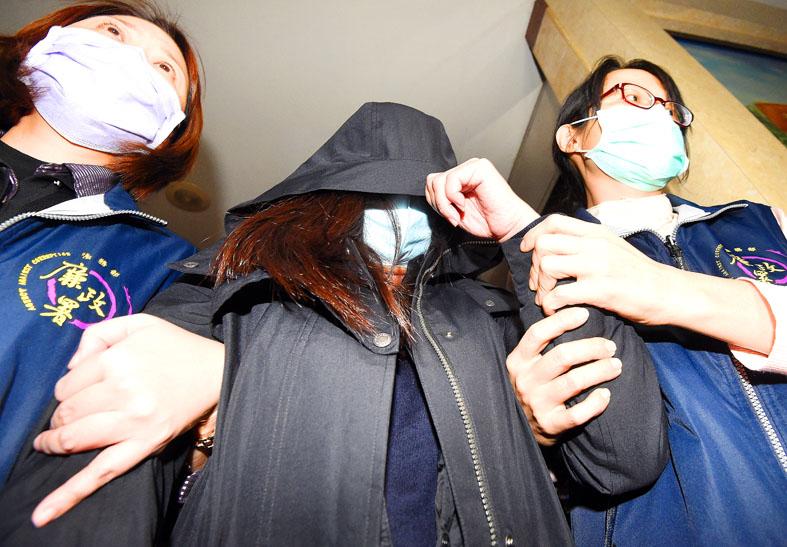Three Capital Investment Trust Corp (群益證券投資信託) employees were yesterday released on bail after being questioned over their suspected connection to a corruption investigation involving Ministry of Labor official Yu Nai-wen (游迺文).
Hsieh Chih-ying (謝志英), vice president of Capital Investment Trust’s assets management division, fund manager surnamed Lin (林) and analyst surnamed Tang (湯) were released on bail after being questioned overnight, the Taipei District Prosecutors’ Office said.
Yu, head of the domestic investment division of the ministry’s Bureau of Labor Funds, was removed from his post on Sept. 18 pending an investigation.

Photo: Liao Chen-huei, Taipei Times
He has been detained since Nov. 27 for allegedly taking bribes from PJ Asset Management (寶佳資產管理) CEO Daniel Tarng (唐楚烈) and others in return for using his authority to allocate money from the Labor Insurance Fund to manipulate the stock price of Far Eastern Department Stores Ltd (遠東百貨).
Yesterday, prosecutors said that they suspect Hsieh, Lin and Tang participated in the alleged stock manipulation, but because Capital owned fewer Far Eastern shares, they are considered minor suspects compared with employees of Uni-President Investment Trust Corp (統一證券投資信託) and Fuh Hwa Investment Trust Co (復華證券投資信託), who are also under investigation.
Those being held without bail are Yu, Tarng, Fuh Hwa executive Chiu Yu-yuan (邱裕元), and Uni-President Investment chief investment officer Chiu Ming-chiang (邱明強) and asset manager Liu Chien-hsien (劉建賢).
On Thursday, the Financial Supervisory Commission (FSC) said that it began a special examination of some investment trust firms, including Capital, after alleged involvement with Yu.
Late on Thursday, the Financial Examination Bureau sent an inspection team to Capital’s headquarters in Taipei, Director-General Wang Li-chuan (王儷娟) told reporters by telephone.
The bureau would examine several investment firms, including Uni-President, Wang said, adding that an examination last year found that the firms had operational issues.
“This time, we will see if they have improved and we will focus on their internal controls, management of their trading rooms, regulations regarding employees’ cellphones or other communication devices, and the measures they take to prevent conflicts of interest,” she said.

MORE VISITORS: The Tourism Administration said that it is seeing positive prospects in its efforts to expand the tourism market in North America and Europe Taiwan has been ranked as the cheapest place in the world to travel to this year, based on a list recommended by NerdWallet. The San Francisco-based personal finance company said that Taiwan topped the list of 16 nations it chose for budget travelers because US tourists do not need visas and travelers can easily have a good meal for less than US$10. A bus ride in Taipei costs just under US$0.50, while subway rides start at US$0.60, the firm said, adding that public transportation in Taiwan is easy to navigate. The firm also called Taiwan a “food lover’s paradise,” citing inexpensive breakfast stalls

TRADE: A mandatory declaration of origin for manufactured goods bound for the US is to take effect on May 7 to block China from exploiting Taiwan’s trade channels All products manufactured in Taiwan and exported to the US must include a signed declaration of origin starting on May 7, the Bureau of Foreign Trade announced yesterday. US President Donald Trump on April 2 imposed a 32 percent tariff on imports from Taiwan, but one week later announced a 90-day pause on its implementation. However, a universal 10 percent tariff was immediately applied to most imports from around the world. On April 12, the Trump administration further exempted computers, smartphones and semiconductors from the new tariffs. In response, President William Lai’s (賴清德) administration has introduced a series of countermeasures to support affected

CROSS-STRAIT: The vast majority of Taiwanese support maintaining the ‘status quo,’ while concern is rising about Beijing’s influence operations More than eight out of 10 Taiwanese reject Beijing’s “one country, two systems” framework for cross-strait relations, according to a survey released by the Mainland Affairs Council (MAC) on Thursday. The MAC’s latest quarterly survey found that 84.4 percent of respondents opposed Beijing’s “one country, two systems” formula for handling cross-strait relations — a figure consistent with past polling. Over the past three years, opposition to the framework has remained high, ranging from a low of 83.6 percent in April 2023 to a peak of 89.6 percent in April last year. In the most recent poll, 82.5 percent also rejected China’s

PLUGGING HOLES: The amendments would bring the legislation in line with systems found in other countries such as Japan and the US, Legislator Chen Kuan-ting said Democratic Progressive Party (DPP) Legislator Chen Kuan-ting (陳冠廷) has proposed amending national security legislation amid a spate of espionage cases. Potential gaps in security vetting procedures for personnel with access to sensitive information prompted him to propose the amendments, which would introduce changes to Article 14 of the Classified National Security Information Protection Act (國家機密保護法), Chen said yesterday. The proposal, which aims to enhance interagency vetting procedures and reduce the risk of classified information leaks, would establish a comprehensive security clearance system in Taiwan, he said. The amendment would require character and loyalty checks for civil servants and intelligence personnel prior to